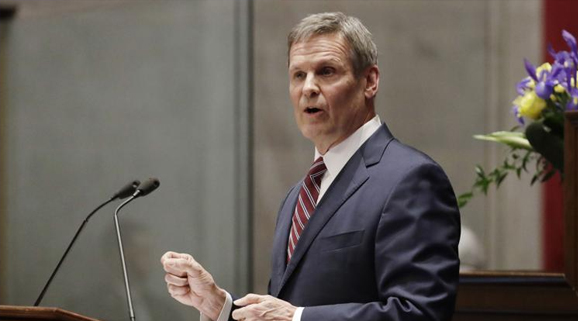(photo courtesy of Mark Humphrey/AP)
The Center Square [By Vivian Jones]-
Tennessee Gov. Bill Lee has raised questions regarding the accuracy of the data and methodology used by Cato Institute analysts in the libertarian think tank’s fiscal management report card.
Cato ranked Tennessee as the worst Republican-led state on fiscal management, awarded Lee a D grade in its Fiscal Policy Report Card on American Governor’s 2020, which was released Monday.
Tennessee historically has earned high marks for fiscal responsibility. The state was ranked the most fiscally responsible state by U.S. News and World Report last year, and the Mercatus Center ranked Tennessee third in the nation for fiscal health in 2018.
“There are some basic factual errors with [the Cato] report, namely, the claim that we have dipped into rainy day funds and that state spending increased by 10%,” Lee spokesperson Gillum Ferguson said. “Not only have we not touched our rainy day fund, we have made record deposits to prepare for the future.”
The Cato report cites Lee’s “large spending increases” as one reason for the state’s low grade, and it claims the pandemic-related economic downturn forced Tennessee to dip into the state’s rainy day fund.
“With the health crisis and recession this year, Lee and state legislators are now having to dial back those increases and dip into the state’s rainy day fund,” the report said.
Tennessee, however, has not touched the state’s rainy day fund in response to pandemic-related economic setbacks this year. In fact, legislators appropriated funds to make two large deposits to the rainy day fund this year, totaling more than a half-billion dollars. According to state data, Tennessee’s rainy day fund balance increased from $875 million in fiscal year 2019 to $1.1 billion in fiscal 2020. The deposits are projected to bring the fund balance to $1.45 billion by the end of the current fiscal year.
Cato Director of Tax Policy Studies Chris Edwards, who headed up the report research, said the report’s claim about the state’s use of rainy day funds originated from a Tennessee Journal news article. The article cited a state press release outlining the planned use of “reserve funds” to address the pandemic-related economic downturn.
“ ‘Rainy day’ and ‘budget reserves’ are often used interchangeably, although I understand that each state, perhaps [Tennessee], has specific definitions,” Edwards told The Center Square in an email.
While the article outlined how “reserve funds” would be used, it did not mention any plans to dip into the state’s rainy day fund and cited a $325 million contribution to the rainy day fund.
“Whether the state used rainy day funds or not would not affect [Tennessee’s] score,” Edwards said. “It is just a point of background information in our writeup.”
Regardless, Cato said it stands by the rainy day fund claim.
Grades largely were based on per-capita spending increases. Edwards said Lee’s grade was based on pre-pandemic spending proposals, not on actual appropriations made this year.
“Lee scored poorly in this study because he has supported large spending increases,” the report reads. “After presiding over a 10.8 percent general fund increase in 2020, Lee initially proposed a 7.3 percent increase for 2021.”
State spending did increase by 6 percent, from $17.9 billion in fiscal 2019 to $19 billion in fiscal 2020, state data shows. While Lee’s proposed $20.1 billion in state spending for fiscal 2021 would have resulted in an overall spending increase, Ferguson said actual state appropriations decreased this year.
“While the report claims we increased spending by 10%, our state appropriations actually decreased from FY20 ($19,194,599,250) to FY21 ($18,957,544,278),” Ferguson said.
Edwards said the analysis focused on “legislated changes in revenues,” for which governors are directly responsible. However, basing an analysis solely on per-capita spending leaves out many factors, most significantly, Tennessee’s state revenue collections, which according to state data have increased significantly in recent years.
In his 2020 state of the state address, Lee proposed a 7.3% spending increase for fiscal 2020 after the state saw a 11.86% increase in revenue between January 2019 and January 2020.
The Cato report also noted Lee’s track record on taxes as a reason for his low grade, claiming Lee “has approved increases in taxes on online sales and sports betting.”
Lee signed two pieces of legislation this year allowing taxes on online sales to be collected. The governor repeatedly has said recovering sales tax on online purchases does not constitute a tax increase but recovery of taxes already levied by statute.
Sports betting legislation that included a built-in tax passed the General Assembly in 2019, but it became law without Lee’s signature. While Lee did not veto the bill, he expressed disapproval, saying that he did “not believe the expansion of gambling through online sports betting is in the best interest of our state.” No increase on sports betting taxes has been proposed or approved since.
“Tennesseans know better than to judge the state’s finances based on poorly conceived reports from a Washington, D.C., think tank,” Ferguson said.





One Response
Bill Lee has abandon the citizens , leaving the judge appointments to Cameron and not to our elected officials !
He gave 13 million dollars to Randy Boyd to build a ball park in downtown Knoxville . And county commissioners have bailed the ball park out by guaranteeing the debts each month. Money talks and B S walks . So disappointed in Bill Lee. He lies !!!